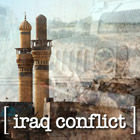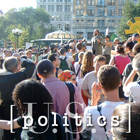
|
AT LAST THERE IS DEBATE, THE STAKES HIGH & NO ONE PLEASED
20 November 2005 Last week, Rep. Murtha (D-PA), a decorated Vietnam war veteran, ranking Democrat on the House defense appropriations subcommittee, and a long-time hawk on military issues, called for an immediate withdrawal of US troops from Iraq. The announcement was seen as a radical policy shift, despite the fact that Murtha had been critical of the current war policy more than a year ago, and shocked the nation's capital into heated debate. As a means of trumping debate altogether, the Republican leadership called a late night vote on the Iraq withdrawal for Friday night, where the motion was defeated 403-3, but the Washington Post reports that "members nearly came to blows" when a novice Republican member suggested Murtha was a "coward", despite his personal sacrifices in wartime. The major issue is now Iraq. Recent polls have reported that nearly 2 in 3 Americans now oppose the war and believe the president has botched its prosecution, and amid new revelations of secret prison camps in ex-soviet gulags and apparently routine torture, the Senate has just voted to impose a regime of regular reports and updates on the White House, with an aim to turning over sovereignty to Iraqi forces by the end of 2006. The vice president is pushing, publically, privately and in the Capitol building itself, for an exception to the Sen. John McCain's (R-AZ) proposed torture ban, and has been dubbed by one major newspaper the "vice president for torture". This raises in very real and explicit terms a debate which all in Washington had hoped could not even become an issue: whether or not the US government supports torture. The moment seems to be one of burgeoning political crisis, as an embattled majority party, several of its leaders and top officials either under investigation, indicted, forced out or rebelling, searches for a way to make its platform apply to a changing environment of opinion and criticism. The press has reawakened after years of deferential apologetics, the Congress has begun to assume its constitutional oversight responsibilities, after years of the same, and the public is turning a skeptical eye. Fmr. Secretary of State Colin Powell has expressed offense had having "been lied to" by the government he was serving, with regard to debunked testimony he gave to the entire world community by way of the UN, in early 2003. And the president's own father has reportedly tried to get sound advice to his son through the person of trusted statesman Brent Scowcroft, to no avail; the White House has rejected Scowcroft outright, permitting no meetings. The problem with debate coming now, as it does, the reason for the heated flare-ups and the near fisticuffs, is the utter lack of such open debate which has been seen thus far. Nearly 3 years into the Iraq conflict, the nation's capital is engaged in its first truly open and heartfelt debate about the merits of invading Iraq, deposing its dictator and committing hundreds of thousands of US soldiers to securing the nation against an ever-spreading guerrilla insurgency. Colin Powell has been quoted as saying "there was no meeting" to decide Iraq policy, openly suggesting that cautious advisers like himself were shut out of the process of deciding and planning the invasion. Newsweek magazine has recently detailed the administration's efforts to attack and silence dissenters: Now, Newsweek suggests "a week Iraq [may] become Iran's playground". In some ways, the invasion and subsequent occupation of Iraq, whether as a matter of course or due narrow-minded or ill-studied planning, has effected precisely the opposite of its intended consequences. The nation is now more dangerous that it was before and is becoming a "playground" and a safe-harbor for radical Islamist terrorists. The lesson is that democracy does work, or would have worked better, that planning for something as complex and controversial as the takeover of a foreign nation, deserves perhaps more than any other issue, the advice and consent of the entire populace, at least through its representatives. Open debate would have yielded a fierce competition of ideas in which the more sound policies would be more likely, not guaranteed, to emerge. This is one of those strange highly subjective periods and issues where the subjectivity of the matter is not one of opinion, but of fact and of conflicted fact. The nation now faces a test of its "resolve" to uphold the ideals of democracy, to force its own bedrock principles on its own leaders, to decide whether torture is ever not "cruel" treatment, to opt for brutality or constitutionality in blanket military policies, precisely because there has not been enough debate. Now is the long-delayed hour for debate. Lawmakers will have to choose very carefully whether to take the side of those who want to combat the chaos by adding torture to the list of unprecedented policies, to side with those who believe the war has been an unmitigated success (even the president has said he made mistakes in Iraq policy, though he did so accusing his opponents of making the same errors in judgement regarding intelligence), or whether to take the principled stand for the rules laid out in the Constitution and on which a democratic system must be based. Ultimately, it is not the debate, or the vigorous dissent, which is powerful or even unsettling; it is the late hour of the debate's being opened, the long months where the normal democratic process of debate and counter-attack had been put off, that delay of 3 years irresponsibly quickening the pulse of real enemies posing real security threats and plunging the nation into a genuine identity crisis over the meaning of democracy. [s]
SADDAM DECRIES TRIAL PROCESS, QUESTIONS AUTHORITY OF JUDGE, REFUSES TO ID HIMSELF At the opening of his trial, Saddam Hussein, charged with ordering the killing of 143 Shi'a —presumably opponents to his rule— in 1982, was defiant. He decried the judicial process set up to judge him as illegitimate, questioned the authority of the judge overseeing the proceedings, and refused to acknowledge his identity. [Full Story] REUTERS REPORTS 3 JOURNALISTS AMONG ABUSED IRAQIS The Reuters News Agency is reporting that 3 Iraqi journalists working for the agency were beaten and sexually abused when they were detained in January, while covering the story of a downed helicopter. The abuses occurred not at Abu Ghraib prison, but at the Volturno Forward Operating Base, near Fallujah. Reuters latest publication of the story is due to the fact that the Pentagon has not responded to requests for a review of an initial military report that found no torture had occurred (issued long before the Abu Ghraib photos had become public). [Full Story] |
||||||||||
|
|||||||||||







